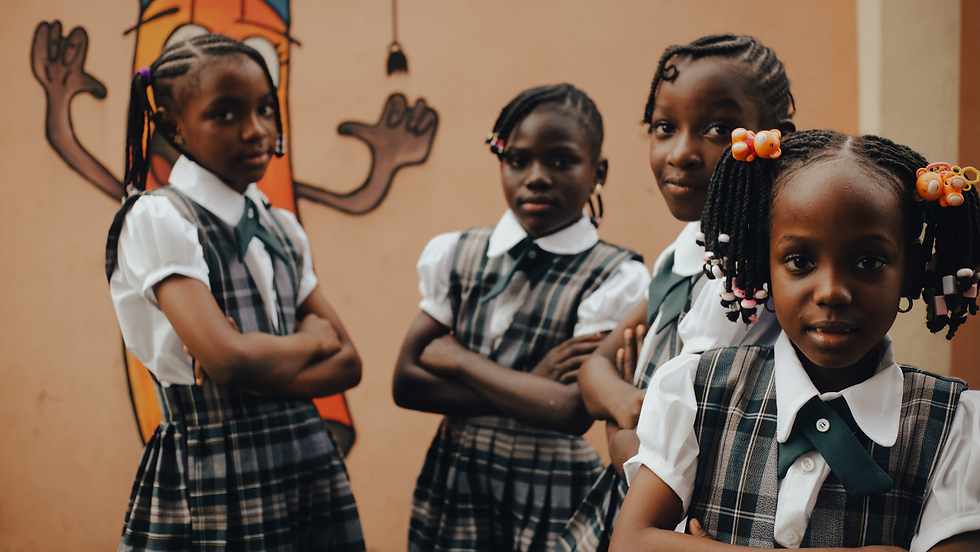Moving to Ghana: A Homecoming for Black Families
- Michelle Rose

- Mar 1
- 3 min read

Ghana has become a top destination for Black families looking to relocate, thanks to its welcoming culture, stable democracy, and deep-rooted connection to the African diaspora. Since the Year of Return in 2019, thousands of African Americans and Caribbeans have moved to Ghana, seeking a fresh start in a place where they feel seen, safe, and celebrated.
If you’ve ever dreamed of raising your kids in a majority-Black country with affordable living, high-quality international schools, and a strong expat community, Ghana might be the perfect place for your family.

Education
One of the biggest concerns for parents moving abroad is education. Luckily, Ghana has plenty of high-quality international schools, especially in Accra. These schools follow American, British, and IB (International Baccalaureate) curricula, making it easy for kids to transition.
Most international schools have small class sizes, diverse student populations, and extracurricular activities. While tuition can be high (ranging from $5,000 to $25,000 per year), many parents find the quality of education well worth it.
💡 Pro Tip: Choose your school first, then find a home nearby to avoid long commutes in Accra’s traffic.

Safety & Community: Feeling at Home
Ghana is one of the safest countries in Africa, with:
Low violent crime rates compared to many U.S. cities.
A welcoming attitude toward African Americans and Black expats.
A strong sense of community – neighbors look out for each other.
Many Black expats have formed support groups and networks to help new families settle in.
Popular Areas for Black Expats & Families
East Legon – Upscale, close to top schools, restaurants, and shops.
Cantonments – Secure, quiet, and home to diplomats and professionals.
Spintex – More affordable, but still close to Accra’s hotspots.
Tema – A bit outside Accra, but growing in popularity for families.

Cost of Living: What to Expect
Living in Ghana can be affordable or expensive, depending on lifestyle. Most families can live comfortably on $2,500–$5,000 per month.
Average Monthly Costs for a Family of Four
Housing (3-bed home in Accra) – $800–$2,500.
Groceries (local & imported) – $400–$800.
School fees (International schools) – $500–$2,000.
Transportation (Uber & fuel) – $100–$300.
Utilities (Electricity, water, Wi-Fi) – $100–$250.
Cost-Saving Tips:
Living outside Accra (Kumasi, Cape Coast) can cut costs significantly.
Shopping at local markets for fresh food is much cheaper than grocery stores.

Healthcare: Access & Affordability
Ghana has public and private healthcare options. Many expats prefer private hospitals due to:
Higher-quality care and shorter wait times.
Affordable doctor’s visits (about $30–$50 per visit).
International health insurance for major medical needs.
Health insurance plans range from $500–$1,500 per year, depending on coverage.

Ghana offers a rich cultural experience and a lifestyle that emphasizes:
Outdoor play – Beaches, parks, and adventure activities.
Community involvement – Neighbors and local culture make kids feel included.
A strong connection to African heritage – Visits to historical sites like Cape Coast Castle.
Best Family Activities in Ghana
Labadi Beach – Horse rides and live music.
Aburi Botanical Gardens – Nature walks and picnics.
Kakum National Park – Canopy walks and wildlife spotting.
Cape Coast Castle – A meaningful historical experience.
Legon Botanical Gardens – Zip-lining, playgrounds, and lakes.

Practical Tips for Relocating to Ghana
Visas & Residency – U.S. citizens can stay 90 days visa-free. Long-term options include residency permits or the Right of Abode for African descendants.
Work & Income – Many expats work remotely, start businesses, or invest in real estate, tourism, or agriculture.
Housing – Rent before you buy. Most landlords require 1-2 years’ rent upfront. Negotiate where possible.
Community Connection – Join Facebook groups like Expats in Ghana or African Americans in Ghana for networking and advice.
Cultural Adjustments – Expect a laid-back schedule (African time), cash-based economy, and occasional power outages ("dumsor").
Final Thoughts: Is Ghana Right for Your Family?
If you’re looking for:
A safe, welcoming, and culturally rich environment for your kids.
A majority-Black country where you feel a sense of belonging.
An affordable yet high-quality lifestyle with a supportive expat community.
Then Ghana could be the perfect place for your family. While challenges like traffic and power outages exist, the sense of community, opportunities for Black families, and overall quality of life make up for it.
Moving to Ghana is more than a relocation—it’s a homecoming. If you want your children to grow up in a place that reflects their history and culture, Ghana is ready to welcome you.
If you are considering a visit Click Here
Is Ghana on your list? Tell us your thoughts in the comments!





Comments